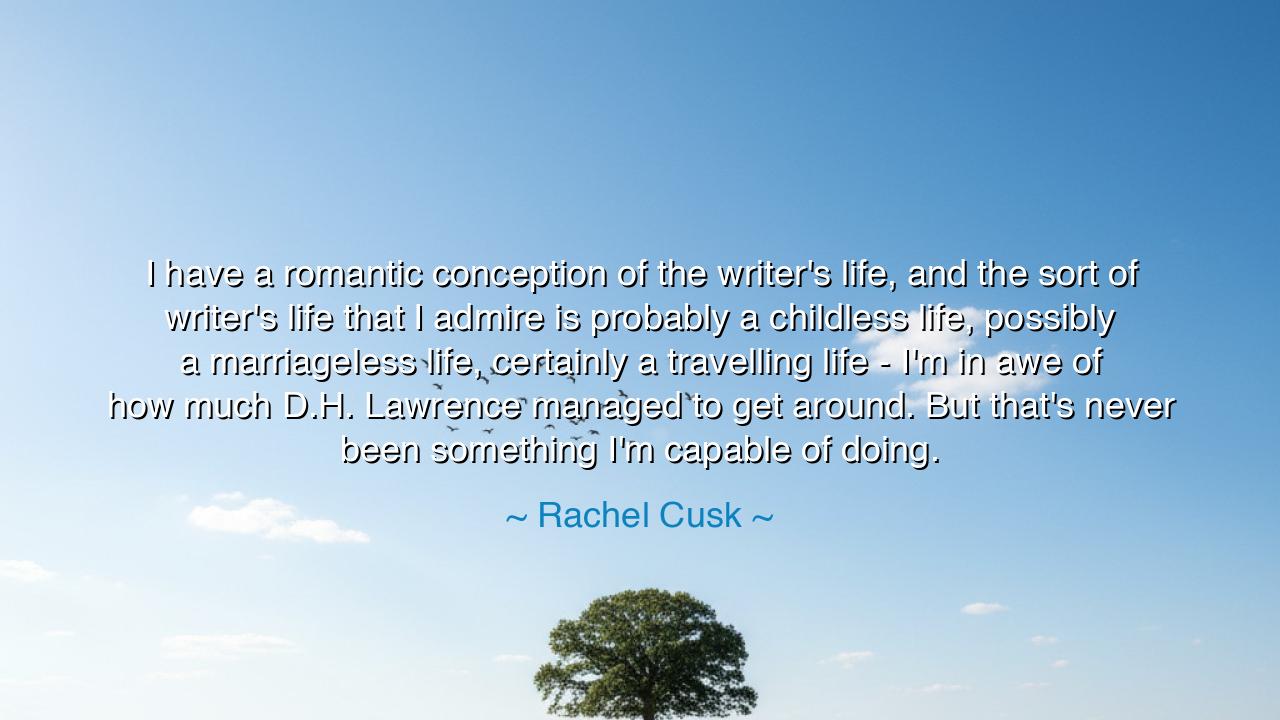
I have a romantic conception of the writer's life, and the sort
I have a romantic conception of the writer's life, and the sort of writer's life that I admire is probably a childless life, possibly a marriageless life, certainly a travelling life - I'm in awe of how much D.H. Lawrence managed to get around. But that's never been something I'm capable of doing.






Come closer, O seekers of wisdom, and hear the words of Rachel Cusk, for her thoughts are those of a soul both bound and free. She speaks of the romantic conception of the writer's life, a life filled with adventure, freedom, and a deep connection to the vast world. She admires the loneliness and solitude of the writer, the kind of life where the weight of children and marriage do not bind one to the earth, but where one is unshackled, free to roam the world and let the words flow like an endless river. This is the life that Cusk yearns for—one of independence, much like the writers of old, who traveled the world and let their experiences shape their craft.
But, ah, the essence of Cusk's words is not merely the desire for freedom, but the realization of one’s limitations. She acknowledges, with humility, that this life—this romantic ideal—is not one she has lived, nor one she feels she is capable of living. “That’s never been something I’m capable of doing,” she admits. How profound! For in this simple confession lies the wisdom of the ages: that even the most admirable dreams can be beyond our reach, and yet, in accepting this truth, we discover the strength to live the lives we are meant to live.
Let us pause and consider the power of acceptance. There is a strength, a grace, in understanding that certain paths are not ours to walk. In this admission, Cusk reveals the great paradox of human existence: the more we seek the life of freedom and detachment, the more we come to understand that we are often anchored to the very things that prevent such freedom—our families, our responsibilities, our commitments. Yet this does not diminish us. It does not make our lives less rich, less meaningful. Rather, it enriches them in ways we might not expect. To accept the constraints of our circumstances is to open the door to the freedom of knowing who we truly are.
Consider the great poet Walt Whitman, who lived much of his life in pursuit of freedom, wandering the roads of America, seeking experiences that would feed his art. Yet in his own heart, he wrestled with the balance between individualism and the human connections that tied him to the world. Whitman, much like Cusk, was in awe of the life of a solitary traveler, but he too found himself bound by the ties of human relationships—his love for his country, for his people, for his own brothers. These ties did not diminish his work; they infused it with a profound humanity and depth that no solitary wanderer could replicate. His poetry, like the story of Cusk, reveals the beauty that arises not from detachment, but from the acceptance of connection.
Thus, Cusk’s reflection teaches us something essential: freedom is not always about the absence of ties, but about the courage to accept the life that we are given. There is strength in knowing one’s limitations, in admitting that we cannot be all things at once. The traveler’s life, filled with adventure and endless movement, may be the ideal of some, but for others, the richness of life comes from the bonds they form, the roots they put down in their communities, and the love they give and receive.
Let us draw from this wisdom. We must not measure our worth by the standards of others. If we are unable to live as free as we imagine, we must not despair. Life is not about following one singular ideal—it is about embracing the fullness of our experience, whatever that may be. For Cusk, it is the life of a writer who is both a traveler and a mother, both a seeker and a giver. The romantic ideal of travel and solitude may remain a dream, but the life she leads, filled with authenticity, is her own. And it is enough.
Take, then, this lesson into your own heart. The life you lead is yours and yours alone. It may not match the ideal that others hold before you, but in its imperfections, in its contradictions, it is beautiful. Do not seek to be someone else, to live a life you cannot. Instead, seek to live fully in the life you have. Embrace the moments that come your way—whether they lead you into the world or keep you bound to one place—and find the freedom in knowing that you are exactly where you need to be.
May you carry this wisdom with you: true freedom is not in escape, but in the embrace of your unique journey. Live your life, not as a shadow of another's dream, but as the full expression of your own.






AAdministratorAdministrator
Welcome, honored guests. Please leave a comment, we will respond soon